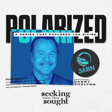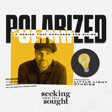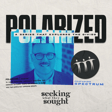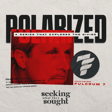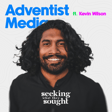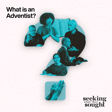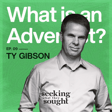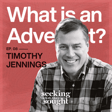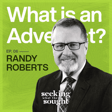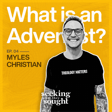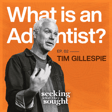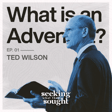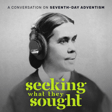Become a Creator today!Start creating today - Share your story with the world!
Start for free
00:00:00
00:00:01

POLARIZED | Craig Hadley from Paradox Church
Polarized is a series that explores the divide. Our goal is to see if we can find common ground despite our differences, both on the “right” and “left."
In episode 4, we sit down with Craig Hadley, controversial pastor of Paradox Church in Southern California.
Have a question you want us to discuss? Comment? Maybe you disagree with something we said? Either way, we'd love to hear from you! Shoot us a DM on Instagram or an email at: seekingwhattheysought@gmail.com
Transcript
Introduction and Humor
00:00:09
Speaker
Hey guys, welcome to Seeking What They Sought. My name is Jesse, and we are here today with Craig Hadley, who is the lead pastor of or the pastor of Paradox Church in Redlands, California. um it's it's ah We are in our series called Polarize. Wow, I had to just... I've been talking about this like all the way up to this episode and just totally blanked on it. where am i Yeah. So well while while I'm forgetful, Sean just sounds like a potato and that's because he's been sick and, um, and actually, well, I know I shouldn't have said that. I should just say that you always sound like a potato.
00:00:42
Speaker
Thanks.
Craig's Background and Journey
00:00:43
Speaker
We're here with with Craig Hadley. Actually, Dr. Craig Hadley, technically. Do you get to say that when you're a dean there? Ooh, doctor. Yeah. Do you have a doctorate of ministry? I do, doctor. If we really want to have fun with it, I can say I'm Reverend Dr. Craig Hadley. Oh, shoot. At some point, you get so pretentious, nobody listens to you anymore. So you can just call me Craig. So, Craig, you have a doctorate in biblical contradictions, which is ah which is a pretty interesting i way to go when you're talking about degrees and and what you're going into. I'm sure we'll talk about that more. Can I just say, Craig, that when when you said that, I was like, that's the most on-brand doctorate for Craig Hadley to have. When I told people I was going to be studying biblical contradictions and doing my doctoral work in that, um there wasn't anybody that said, that's weird for you. So it was very much people said, that's about right in your wheelhouse. Yeah.
00:01:33
Speaker
So i Craig, we've we've known of you because you you started up Paradox Church and that is sort of known, especially down here in SoCal. But why don't we talk a little bit about your journey to the point that you're at now? I work at Loma Linda. I think you worked at, you were like an intern at Loma Linda for a bit, weren't you? I was an intern um in 2008 and 2009 at Loma Linda University Church. Nice man. So, you know, so some, some cross over there, but I mean, let's go back to maybe your journey into, into pastoring and then, and then how you get to where you're at now.
00:02:07
Speaker
Yeah, I grew up in about as Adventist of a home as I possibly could be. um On both sides, both sets of grandparents were third generation ah Adventists. So I'm fifth generation from from four different grandparents when it comes to Adventists. I went to SDA schools, kindergarten to 12th grade. I went to Montana State University for architecture for college. And it was the first time I made friends with people outside the Adventist tradition. um And I mean, even while I was there, I was at the Mountless church in Bozeman, Montana. Um, and I had a great experience with church and nothing. i I enjoyed it. And as I heard my friends from Montana state talk about their experience with church and how negative it was, I was kind of surprised because I had such a positive experience with it. Um, so it was the relationships I made with those friends that made me want to be a pastor. Um, I'd never thought about it before then. And, uh, came back and went to La Sierra seminary.
00:03:06
Speaker
ah from 2008 to 2011 I graduated and then I became a pastor before I graduated. In 2010 I started work at Crosswalk and then I worked at Redlands SDA for 2012 to 2015.
Founding Paradox Church
00:03:23
Speaker
um In 2015, started getting the sense that God was calling us to start a church. and It wasn't just me, it was several other friends. And so we we talked and we prayed and we sought the Spirit's guidance. And after some time, we secured funding for a church and we went to the conference office ah not once, not twice, but five times and asked them to start a church with us.
00:03:47
Speaker
The conference office wasn't interested, um which you know I've got a little lot of sympathy for conference officials. I don't know what it's like to be in charge of over 100 churches. Seems like a lot to me. um um I'm plenty busy with just one. so So what do you do when your church doesn't see the same call of God that you see for your own life, right? And so my friends and I prayed and we got the sense that God was calling us to start a church. And so we stepped out and did a non-denominational church plant in 2016. And we started Paradox Church, not really knowing at all what we were doing.
00:04:22
Speaker
um And we've been ah meeting as a church for eight years now. A couple things about our church, just to give you some some insight. At Paradox, we our our mission is to see and embrace Jesus Christ in all. And what that means is there's this idea out there that you go to church to be in God's presence. um I really believe in the omnipresence of God. And so ah we our church tries our best to turn our focus outward to help people see God's presence in 168 hours of the week, not just the one hour on Saturday or Sunday morning. um And so our whole goal is to help people see God's presence in their work or in their cubicle on a Tuesday morning at 9.30. Also in Friday night or Saturday or through the Sabbath.
00:05:13
Speaker
um And that's our big thing. if If people can see God's presence everywhere, as a church, we've done our jobs well. So that's that's ah that's what we try to do as a community, is to see and embrace Jesus Christ in all that we encounter, in all people that we encounter. and Yeah, go ahead. Can I ask you real quick to go back to when you were talking about the shift for you of of those relationships with people at Montana State. Did I get that right, Montana State? Yeah, you got it. of i those relationships being a catalyst for you saying, I want to be a pastor, was it something along the lines of like, I'm seeing that they don't have a good experience with church or questions about God or whatever it is. And I want to be part of, or I want to create a space where, where those questions could be answered for people like them or, or what, or was it something else? What was it for you?
00:06:02
Speaker
So my attitudes
Evolving Motivations and Views
00:06:03
Speaker
have changed a lot since this answer came to be. So I'm going to tell you my answer as long as people who are listening can hold it loose enough to kind of hear my journey since then, because yeah it's your supply it's not like I decided to become a pastor and my faith froze and I stopped changing my perspective or anything. But I've told him this. So my best friend in Montana State, his name was Tyler. He's an atheist. And I was really worried about his eternal destiny. And so I thought if I could do something about it as a church, like as a pastor, I could potentially start a church that would speak to atheists and agnostics primarily um first. And maybe we could do something about his eternal destiny. um I will tell you my attitude on that has changed significantly. But we're talking that was, you know, 15 years ago, 15, 16 years ago that we were we were going through that. And yeah, I
00:06:55
Speaker
Loved my friends so much that it's like if there's anything I could do for him to help with his eternal destiny I would I would do that. Yeah, and so now considering the journey you've had since then What would you say is is? Because I mean, I think like, you know for Anthony and I and and calling to being a pastor um You have those initial things that some of it might carry with you some of the initial like things but also changes over time because it's just part of the reality so what would you say is is more of a a thing now, that is is ah is a a motivation to be a pastor. Yeah. ah Are you talking about in regards to the eternal destiny part or why I'm a pastor still? just Yeah. I guess like if if that was your primary reason like you know yeah at the time, what has shifted since and and then and what what would be your more like holistic i guess way of saying it now? Yeah.
00:07:46
Speaker
so um When I think about God and God's job of deciding who goes into heaven and who does not go into heaven, I have zero interest in doing that job. like I think I'd be horrible at it. I think I'd be petty. I think I'd seek revenge on the people who wronged me personally and be like, well, you can't get in because I'm still mad at you for that thing. um But I also know that I feel like I would let in quite a bit of people to heaven. And as much as I want to think of myself as an open-minded and inclusive person, I think God is so much more inclusive, so much more generous, and so much more has much wider arms than I do. So I always live my life in a way assuming God would let more people into heaven than I would.
00:08:31
Speaker
wow yeah I used to be a universalist, but I think that's too easy. And what I mean by that is it's too easy to just say, well, everyone's saved. yeah I actually think it's harder when you're thinking about the people who've really wronged you and what it means to let that person in. And while I may not let them into heaven, I have faith in a God who will let more people into heaven always than me. So it always challenges me to become a more loving and more inclusive person. yeah That's super interesting. That's a whole other question we might even get into. yeah but but tell me So we're doing a series called called Polarized and talking to people on kind of use either side of the spectrum. I know um just to kind of clear clear this up before we get in, I know that currently you would not describe yourself as Adventist, correct?
00:09:20
Speaker
Yeah, that's correct. When did that shift for you? because and and the Part of the reason we're having on this podcast is I know for a lot of people in the Adventist world, especially down here in SoCal, that Paradox is a place that they find a home in. you came from Adventism. um there You guys still worship on on this on Saturday, call it the Sabbath, all of those things. I'm not saying that's an exclusive a domain of Adventism. As much as there's there's there's there seems to be some carryover from your experiences in Adventism to now. So understanding though that that you wouldn't call yourself that, what when when approximately was that shift or or how would you describe that shift?
Leaving Adventism
00:10:00
Speaker
Yeah, so when we were praying to see if God was asking us to start a church, right, there was some some difficulties with the Redlands SDA church, um some disagreements on things, um you know, and so things that are small to things that are big. Um, and it was really, it took a lot of, it took a big toll on me personally. And, um, I did a lot of searching because people were saying things like, well, you're not Adventist enough, which was mind boggling to me because I didn't know how to be more Adventist. I was ordained. I was raised in an Adventist family. I went to an Adventist seminary, like I yeah Adventist schools, all of that. I couldn't, I couldn't figure out how to be more Adventist. So I went to Fritz Guy at La Sierra.
00:10:41
Speaker
Um, and Dr. Guy was the secretary when they wrote the 27 fundamental beliefs in 1978, 79 and 80. Um, so pretty, pretty big authority on who's an Adventist who's not in my theory. And, uh, I asked him, I said, Dr. Guy, a lot of people are telling me I'm not Adventist. Um, I, I feel like an Adventist. I want to be Adventist. What makes someone Adventist? And he gave one of the best answers I've ever heard. He said, anyone who finds a spiritual home at an Adventist church is an Adventist. Oh, dang. We should have this done. What is the Adventist series? Yeah, nice. Yeah, it's good. And so he said that and I kept speaking for a couple of months and it was obvious I wasn't welcome at Redlands SDA and I realized, oh, I'm welcome to be in the Adventist church as long as I keep my mouth shut.
00:11:34
Speaker
So I felt like I could make peace with me not being Adventist based on that definition. So Dr. Guy did not say that to me to try to make it more exclusive yeah or to push me out. It helped me have a great amount of peace when I was considering whether or not to step outside and do this non-denominational church. And I am very grateful for that. um And just to give you some perspective, Dr. Guy attended Paradox at least once. I think it was twice, but I know for sure once. Um, and was just, you know, he's a major mentor of mine and I, I love that man. He passed away recently, um, but was very proud of me and very, um, very interested in what I'm doing and just really validated this yeah journey that I've been on. And I'm very grateful to for his teaching in my life. Yeah. That's, that's really interesting. Cause when I, when I think of how you responded about your experience leaving, like you tried to stay, you didn't want to just like,
00:12:30
Speaker
antagonize people and get them upset at you. You didn't have that spirit, it sounds like, and and it became clear that for you to stay, you couldn't speak what was on your heart when it came to truth and when it came to what you believe the direction of the church should be. That's something we've talked about a lot um over the years, especially within the last year or so, is creating a culture where you feel safe. If you're an Adventist professional, whether it's an educator, a pastor, you know, you know someone else that's ah higher up in the church, to have the safety to talk. And that's it's it's just incredible, Craig, how many people have written into us saying, like, I wish I could feel as free as you guys. I'm jealous that you guys have had these conversations and and it's... Haven't been fired. Yeah, haven't been fired yet. Well, we'll see. Some of it is stupidity on our part. Some of it is stupidity. Yeah, but but really, um it it seems like it's only been more recently that there are more pockets
00:13:29
Speaker
popping up within the Adventist church where it's possible um to have conversations that push the boundaries of what it means to be Adventist, what it means to, you know, how do we interpret the Bible? How do we practice it in a healthy way? um So, yeah, i that that makes me sad that you were pushed out. um When you look at how things have changed in the church, or maybe from your perspective they haven't changed enough, do you think that there is a time in the short-term future or maybe even longer longer term that you could return to Adventism or is that just not something that you're interested in? If they ever called me, I would sit down and talk about it. yeah There's lots of logistical questions and details, but I'm always open to wherever God is leading.
00:14:17
Speaker
I never will slam the door on an opportunity or somebody wants to talk. I try my best to remain open um to where God leads. So if they called me, I'd be happy to talk to them. And that's kind of where we left at the last conversation I had with them. um And so i've I haven't felt antagonized by them by any means, ah them being the the conference office. yeah ah or And when we started this church, There was a lot of questions and concerns and all of this thing. That's all settled down a lot as they've realized that ah we're not anti Adventist. I don't want to be an anti Adventist church. um And the truth is when you're part of the Protestant Christian tradition, anytime you leave, people are assuming that you're protesting something.
00:15:05
Speaker
That's like, you know, that's our heritage, right? ah protestant yes um We didn't really protest anything on our way out. We just felt that like we had a community of young adults at at Redlands SDA and um we just felt like God wanted us to start our church and we tried our best start with the Adventist church and it wasn't an option. Yeah. So so there wasn't something in part, you said that you weren't welcome anymore at Redlands. Was there something What was it um a multitude of just a bunch of different things that came together over the course of time that made that clear? Or was it a was there a watershed moment? Was there one teaching or belief that you held and and made vocal that you know broke the the camel's back you know where you you had to leave? So I wish it was as clear as that where they would say, hey, we're asking you to leave because of this. um I did not get that. And most people I've spoken to, not just in the Adventist tradition, but in larger denominations.
00:16:02
Speaker
um rarely get that as well. ah just it's It's just all sorts of concerns and complaints that come their way that it's like it's probably best um if we move on. And I you know i respect that. um i will tell you the um the I will tell you when it comes to what I got in trouble for, i I was asked to bring college students into the church and we had a lot of octogenarians show up to our college service And it didn't sound like Adventism to them. And um so there there was a lot of concerns that I wasn't Adventist enough. I never got in trouble once for anything I said in the main service um because I understood the context of like, You've got to be like rah rah, Adventism in the main service at Redlands SDA. And there was plenty of that for me to feel. Like I talked about how much of a gift it was that George Storrs gave us the the idea of annihilationism. So we didn't have to believe it. he Like I talked about that history and how beautiful it is. Like the fact that I didn't have to deconstruct
00:17:07
Speaker
you know eternal torture is kind of a gift from Adventism, right? It is, yeah, man. Celebrate that in the main service. I that's i absolutely think we should. and so yeah that I asked the questions that all the college students were asking and it felt like heresy or felt like I was not Adventist enough from their perspective. Would it be would it be fair to say that, um and I'm just going back to this because it's it's interesting to me to go back to your experience and um in Montana. that that was still a big passion of yours, the the those on the fringe, the atheist, the agnostic, those outside, or even those who are still in the church but asking questions in those directions.
Sermons as Discussions
00:17:46
Speaker
is ah and in And I can imagine when you're trying to ask or answer or speak, at least speak to those questions, that's where it stops sounding like Adventism because it's like we're dealing with the whole thing that Adventism often isn't built to answer in its traditional forms. Is that fair to say?
00:18:03
Speaker
Oh, absolutely. I sat next to Tyler for four years straight. And he asked every question you can imagine about faith. And he had way better arguments than I had. Well, we had a lot of way smarter than me, just like a brilliant guy. And the main question he asked was, do you actually believe that? And I would say, yeah, what a question. And then I'd have to go back and think about it. And there's several times I came back and said, I actually don't. And there are other times I came back and said, I actually do.
00:18:36
Speaker
yeah um So when I was writing sermons, I was actually writing with Tyler in mind. At first it was to like convert someone like Tyler. yeah As it's gone on and as it is still today, it's much more to validate Tyler's perspective, understand the argument and say, but this is why I continue to believe in what it means for me in 2024. Uh, if I could go back and give myself one piece of advice, uh, at the beginning of this whole thing, I would say start every sermon by saying sermons are meant to start discussions, not end them. yeah Ooh, that's good. I'm going to end up in a world of hurt.
00:19:15
Speaker
because everyone thought I was trying to end discussions by raising these questions. yeah And i wasn't I was trying to start the discussion as to like, what does it mean to believe that God only saves a small select group of people at the end of time? um as opposed to a God who is generous and inclusive and heaven that doesn't doesn't strike fear into people, but more gives hope to people. yeah um And if I would have started with that, that might've helped a little. I think we would have probably ended up in the same place, sure but it would have given a little more clarity to the direction.
00:19:48
Speaker
hundred I mean, you look at your younger self and you're like, man, I wish I would have said a couple of things. Yeah. That's real. Craig, I'm curious, you know, a lot of, you know, a couple of things that you've mentioned between like a God who's more inclusive rather as opposed to a God who's
Changing Religious Labels
00:20:03
Speaker
more exclusive. A lot of these things you can sometimes, and when we think about kind of the spectrum between liberal and conservative, those liberal those labels, You can kind of place one on one side and one on the other. And I'm curious for you, how, like, where do you see yourself sort of falling off? Well, first of all, how do you feel about those labels, those words? And then where do you see yourself on that? If you, if you had to, if you, you were forced to place your yourself. ideas of it yeah yeah I will place myself on the spectrum. If you allow me to ask you a couple of questions first. Okay.
00:20:38
Speaker
okay If I told you that I'm anti-vaccine, would you label me a conservative or liberal in today's society? Oh, that's all flipped on its head. I would say yes. Yeah, because 20 years ago, it was a liberal movement, right? Right. Oh, yeah, for sure. It's a conservative ideal or movement now. um and But 20 years ago, it was very much leftist starting from Hollywood, right? Yeah. If I told you, I believe our nation should pay reparations to people groups who America has wronged in our history, would you label me conservative or liberal? It's a pretty liberal idea right now. Yeah, I'd say that's a pretty progressive idea.
Interpreting the Bible
00:21:18
Speaker
Well, Ronald Reagan, the most conservative president of the last like 40 years paid reparations to Japanese Americans for wrongful internment during World War II. So that was a conservative moment just a few decades ago. True, yeah.
00:21:33
Speaker
If I told you I believe in biblical inerrancy and the Bible does not contain a single contradiction as 100% inspired by the divine, would you label me a conservative or a liberal? I'm not going to answer that because this feels like a trap.
00:21:48
Speaker
Well, the first time that biblical inerrancy was adopted by anyone as a doctrine was in 1881 by the ah Presbyterian Church. And the Bible's been around a lot longer than 1881. And for the majority of Christian history, people have responded to the Bible without an understanding of inerrancy. So it's a newer, more liberal idea of what the Bible is, even though most people who say, I believe the Bible is inerrant are labeled conservative. So when people say like, what do we do with labels like liberal and conservative? It's like, well, we acknowledge they shift pretty dramatically within one's lifetime.
00:22:27
Speaker
and for percent yeah I prefer much more of a circle understanding, um where there's like centralized power within religious structures, and then there's the margins of religion. and This is not a real liberal.
00:22:45
Speaker
um see you can label me that' also and what why what don um so is I'm very rarely inspired by the power at the center of religious structures. like i mean good I've never quoted the Pope um up until very recently. um in anything, but he's kind of at the center of like religious structures. The most inspiring people to me are always barely on the inside of what is considered religious. And I think that's where Jesus lived. um you know He didn't come to this earth as the high priest, which kind of makes sense when you think about it, right? um He came as a ah ah wandering rabbi that was homeless that was barely on the inside of what traditional Judaism was.
00:23:30
Speaker
Um, he's very Jewish, don't get me wrong, but at the same time, like he was on the fridges of what that meant. Yeah. I mean, he was, he was very much talking about rabbis, Hillel and Shammai and how those two like influenced the way that we understood, um, they, that they understood Judaism and what it meant for them in their day. Yeah. So I'm very interesting. I mean, when, when you look at. For instance, paradox church, which you're the pastor of and some of the things, I mean, on your front page, if I'm correct, you guys have, And this is this is where it gets into like the conversation about today. yeah And you're totally right about like it it's shifting over time. But on the front page, you guys have statements or or to talk about how ah you are a deferming church. You have a statement on women's empowerment and
00:24:19
Speaker
anti-racism. So there's there's obviously in this world, and and like most people would say, that's in the liberal camp. I just wanted to kind of get some context for like being in that space, even if you don't use the context of liberal for someone who's conservative and saying, oh, that person's liberal. What would you say is your guiding principle in all of that? Take away the label. What's the guiding principle for you underlying? Or plural principles. Yeah, or principles underlying your your beliefs at this point.
00:24:58
Speaker
Yeah, so I would start with when Jesus is asked what the most important commandment is in the Gospel of Matthew and then also in the Gospel of Mark.
Love and Spirituality
00:25:05
Speaker
um Jesus says, he quotes Deuteronomy and Leviticus and says, love the Lord your God with all your heart, mind and soul. This is the first and greatest commandment, and the second is like it, love your neighbor as yourself. um And most Christians know that, but he doesn't stop speaking there. He says on these two commandments, hang on all the law and the prophets. which I think is the most important part of that of that whole statement, because he's saying this is what the whole Bible hangs on, you know, for his day and age, obviously. And so in my opinion, the way I interpret that is I interpret as if anything you read in the Bible leads you away from becoming a more loving person, you're reading it wrong and you need to go back and reread it until it makes you more loving.
00:25:54
Speaker
um In Mark, um there's a it's a little bit of a different response because there's somebody else who's hearing Jesus say these two commandments are the most important. And the guy, it's a scribe that's listening to him and he says, wow, it sounds like you're saying this is much more important than all the burnt offerings and sacrifices we make, which, you know, is the whole religious system that they're participating in. And Jesus responds by saying, you are not far from the kingdom of God. So all of this spirituality that is contained within the Christian religion should be leading us to becoming more loving people. And I use that as my guiding principle when I'm writing sermons, when I'm trying to think about what it means to be a Christian in 2024. Obviously, I'm not a perfect person, so it's often three steps forward, two steps back with becoming more loving person.
00:26:47
Speaker
But that is by far the number one guiding principle. And I think I feel very comfortable saying that um just because Jesus seems to give that kind of precedence to it in both Matthew and in Mark. So when you when you say yeah you sorry really quick, when when you say um if the Bible doesn't lead us to become a more loving person or reading the Bible wrong, um what what would you categorize or maybe give an example of either an Adventist or a Christian, the way they read the Bible that would be unloving? Yeah. So let's go to Leviticus chapter 25, where, um, a bunch of white Christians, um, probably related to me at some point, uh, read God saying to, um, Moses from the tent, uh, from the most holy place saying and you could own, so you could own slaves as long as they're not your own people. Well, a bunch of white Christians not too long ago interpreted that as it's okay for us to enslave people of African descent.
00:27:45
Speaker
um and beat the living tar out of them and do whatever we please to them um for three, four centuries. um And they all interpret it. They all went to church on Sunday and in some cases Saturday. um And you know they very much like thought that was okay. um And they interpret it like the literal, you know they they read it literally and they said, well, if God didn't want us to do this, then God would have never said it. um That's the first example that i would that I would call the mind. And in my opinion, um Christianity at large, particularly in America, has really missed an opportunity to teach the heirs of that way. um Because it's a really, really important lesson. I mean, we use the Bible to enable evil. And I say we being white Christians ah use the Bible to enable evil.
Empathy and Understanding
00:28:39
Speaker
And we never really had a debrief as to how that happened.
00:28:43
Speaker
and it should be taught frequently in schools to make sure that we don't make the same mistake again. So I want to i want to talk more about your guiding principles for a second, but I am curious about what, when you look at what you might call the other side, and I'm not trying to make an opposition as much as maybe the other other end of a spectrum, what do you what do you perceive are the guiding principles of a more conservative or traditional space? Yeah, so I'm going to just hesitate a little bit on the other side because the minute I start othering people is when I stop connecting with them. um Now, there are people who drive me crazy. Don't get me wrong. But I mean, some of them are running for president right now, but we don't need to get to that part, right? But I think that what often annoys me or really just grates against me is when I see something in somebody who opposes me
00:29:40
Speaker
that reminds me of myself, right? So I have been through the whole religious wringer, right? I was very anti-LGBT. I i was very, um very much, you know, six day creation and hated scientists and, you know, all their liberal agenda, if you want to call it that. ah I mean, you were from Montana, I feel like. there's yeah i feel like there to say I grew up, I grew up here just to be clear, but I was very, I was a very good Adventist, right? Like, yeah I mean, just people who drank alcohol were just like bringing the world down to hell in a hand basket, you know, all of those things.
00:30:17
Speaker
And while I don't hold those views anymore, the people who annoy me the most are the ones who remind me of that. Cause like, I'm not, I'm not proud of being anti-LGBT. Um, it's part of my story, but I'm not proud of it. Um, and so I try to look back at that and say, okay, how was this part of my story and how have I made peace with this or have have I tried to make things right? Um, and so. When I feel tempted to do like this othering or like pointing to somebody else and saying like, oh, there's, you know, they're wrong or like they're dragging us down on all that stuff. I try my best to empathize with them, um primarily because that's what my therapist works out with me on. I've just got everything. ah but ah But I try my best to empathize with them and do my best to try to to meet them where they are and move forward. ah A common question I get is how do you change somebody's mind about LGBT issues?
00:31:15
Speaker
um The answer, in my opinion, is empathy. um I could put together the best biblical arguments there are, and I rarely change people's minds. um There's something that's different that happens once someone has a brother who comes out as gay, or someone has an aunt who comes out as gay, or somebody says my best friend told me they're trans. Like, ah that that's the stuff that changes things, the stories, the narratives, because it creates empathy within us. um I've never won a biblical argument with somebody. i Well, I shouldn't say that. I've never changed somebody's mind by yeah winning a biblical argument. I'm curious, because um it's you... Definitely. Well, I was going to say, you you you you had described your guiding principle as like,
00:32:05
Speaker
that everything hangs off of this idea that that God is love and then going into those two things. um If that's the case, when you look at someone who tends to be, if if we to take away the word the words other side, someone who tends to be more conservative or traditional space, um it is very easy to look at someone in that space when you're maybe more left leaning to look over to the right and say, you don't have the same guiding principle. And I'm not asking you to make a claim as much as when you when you so when you are interacting with other people, what do you get the sense is a guiding principle of the other side, considering yours. Yeah, so I think that control is a big thing when it comes to religion.
00:32:52
Speaker
ah people love telling other people what to do and being in charge. I mean, this is kind of the story of the history of humanity. um ah And so um I think that there's control. And I will tell you, I mean, as a pastor, you're faced with that temptation. I mean, you guys know you're faced with that temptation on some level because you have to be real careful with how you tell people. I will never tell someone they should get divorced. I let them make that decision themselves. Because if they sense if the pastor is telling them to get divorced, like they'll just go ahead and do it. um Yeah. And like i I don't want to be I don't want to I want them to own it because I don't want them to resent me later. um ah So control is a big one. I actually self-righteousness is a major problem, too. But I have found that to be just as big of a problem on the left as it is on the right.
00:33:43
Speaker
um i i I don't think that the left thinks they have this problem, ah but I fear yeah i've found it where if you don't say things in just the right way, there is quick condemnation and judgment yeah that It's not compassion, it's not empathy. And as somebody who runs in more circles that are left, I constantly try to remind them that self-righteousness is a sin that we all struggle with. And Jesus frequently spoke about this. What I think about, ah this I mean, this is the whole thing. Like when Jesus says in Matthew, like, you know who's leading the way into heaven? It's prostitutes and tax collectors.
00:34:24
Speaker
Well, since I run more in left leaning circles, I don't really have a problem with the prostitute leading the way into heaven. I have a much bigger problem with the tax collector cause that's the modern day oil baron. Yeah. And like that seems real problematic to me. Um, and yet that's yeah an oil baron is the best parallel for me that I can think of. to a tax collector in Jesus's day. So I update that metaphor, or I update that teaching to say like, if Jesus was alive today in America, I think he would say it's undocumented immigrants and oil barons that lead the way into heaven. And no one, no one gets off scot free saying like, well, I do this, it challenges everyone to grow. Yeah. And
00:35:07
Speaker
um And if people feel like, no, no, I do it, like self-righteousness is one of the worst sins facing any Christian today. And I think it was with our people in Jesus's day that most people aren't talking about. yeah yeah Craig, here's how you might respond to, um you know, you had shared your guiding principle, um kind of what Jesus had said, all the law and the prophets hang on this, love the Lord your God with all your heart, love your neighbor as yourself. So if it's not leading you to more love, right, um then we need to reread. And I'm curious because love, as we were talking about before um we started recording, I just, I moved to Texas recently. I'm a recent Texas transplant, never lived in the South before, never lived in the Bible belt. I'm a West coast boy um my whole life.
00:35:55
Speaker
And living down here and having more you know people that I interact with, relationships, conversations with people who are more, you know for the lack of a better term, more conservative or traditional. um What's interesting is what I hear a lot from them on a lot of these topics is that their guiding principle is also love. And they just interpret the way that love leads you to act differently. So you know you had said for someone who maybe comes out as queer, someone on the LGBTQ plus spectrum or something like that, um For them, they would say, hey, well, love is telling them the truth. Love is is telling them the standard. And I'm curious what how you would respond to that, because it seems like it's the it's a similar guiding principle, or at least ah you know they're you're using the same word. You're saying love, they're saying love, but but that love looks differently from the different perspectives. Curious how you would, yeah, how do you think about that?
00:36:49
Speaker
ah Well, ah you don't become an affirming church to make everybody happy. That's that's definitely, I wouldn't recommend that if that's your your primary goal, right? So a lot of people tell you what they think about you being an affirming church, whether you ask them or not, right? And they'll often use an argument very similar to that in the fact that it's like, well, my love of God is what holds people accountable or whatever, right? um something Something along those lines. um To them, I kind of say, okay. ah ah And for me, like the response is like, but how is this calling, I guess, where is it leading you really? Because if it's, well, less and less people are loved by God because only they keep the right commandments. That's not love, that's selectivity and exclusivity.
00:37:38
Speaker
And when I read the story of Jesus, I am constantly impressed by how much Jesus goes to the people that religion says while they're the sinners and lives among them. you know And since we believe this is the presence or the incarnation of God, it I think the the metaphor teaches us that um God is always found among the people that religion says aren't worthy to be in heaven. there's there's There's a lot of argument that people will often bring up say with like the woman caught in adultery and say, we'll see what Jesus told her not to go sin anymore. And I've always interpreted it slightly different than like a blanket statement to perfectionism or something like that. yeah but But there is something that I think we intuitively know that God's love is not built to okay or- Lead us back into death.
00:38:29
Speaker
yeah, to approve of ah of actions that he are harmful or destructive and lead us into death. And I think that's, there is the base level level. If God just said it, then therefore I have to oppose it, you know, like sort of if we take the verses in Romans and other places, and God opposes LGBTQ plus, therefore I must. um But I think there's a lot of people who say, I i i am concerned about their well-being, not take away salvation, take away all this stuff. I believe God loves them. I'm concerned about well-being. And that becomes, again, if the if the hope is to love,
00:39:04
Speaker
then, or if that's the principle, the guiding principle, then the way that I love is I'm concerned about their well-being, and I'm not wanting to be complicit. this is i I hear this from a lot of people who I really respect. like I'm not wanting to be complicit in someone else causing harm to themselves simply because I was too afraid to say something. That's not love either. right and so that seems that seems to like Then it kind of becomes ah definition it becomes dependent on our definition or or I guess what what we believe about the science or what we believe about someone's specific story versus someone else's story about what love is towards people. And I think that's kind of the challenge that we run into. I don't know if you have any thoughts on that. I do. If somebody were to speak to me with that kind of argument, I would say it sounds like you're worried that God might think you're too loving or too permissive or too inclusive.
00:39:55
Speaker
I just have found God to be the opposite of that. The God is so radically inclusive. I struggled to keep up with God, not the other way around. And I agree with that. I think what I'm saying, yeah i I wasn't saying that you said that. I'm sorry. No, yes. sir I just, I take, take God out of the equation. I think some people say, well, if I'm supposed to love, then this It's not about whether or not God loves them or or if God would look down on me. um It's just, I don't want to cause harm to somebody. you know yes So then that all goes to like, how do you interpret science, people's experiences and stories? And so I think that's the challenge because we can end up coming at it from both sides of like, I'm seeking love for the LGBTQ plus community or for for marginalized communities and and things like that. Like, any I mean, we run into this, especially in what you might term liberal cities like Seattle and Portland, where it's like, well,
00:40:45
Speaker
we want to not do the harmful and oppressive things that people have done towards unhoused people in the past. But then it almost becomes like permissive to the point where it's like, wait, is this love anymore? You know, it's it's like, you know, we're just, we're just, we're not even trying to help. them with with drug issues or mental health. We're just like, well, yeah, fine. We we just don't want to put you in jail. you know that that's That's where it's like, well, okay, hold on. We both believe in love, but now we're coming at it from two different contexts. One which says, love is saying, no, don't stay on the street anymore. We need to actually put you someplace where we can get help for you.
00:41:20
Speaker
or love is, no, we don't want to we don't want to to infringe upon their freedom. And so, I mean, you could take that and put it on a lot of issues. But that's, I think, what my where I start wondering, because I agree with you exactly what you said about Jesus' guiding principle, but the hardest thing seems to be application for us.
Paradox as a Safe Space
00:41:37
Speaker
yeah So, I don't know if you have any thoughts on that, like the application on that. Yeah, so ah with with that, I would say um you've named very a lot of different complicated issues, right? I mean, the housing crisis in LA, as we know, is is ah really problematic. And it's changed a lot in the time that I've you know i've lived in this area.
00:41:59
Speaker
um I mean, even the and the people who are unhoused and around the Inland Empire where ah we're from, like, you know, major, major problem. And if anybody rushes in and says, like, I've got the answer, they probably don't because it's so it can seem pretty dire, right? um This is where it's like, are these issues we're talking about or specific people? And all I'm worried about is not solving all the words' world's problems. like I mean, Paradox, we've existed for eight years. and you know
00:42:33
Speaker
We're a community of a couple hundred people. We're halfway there to solve it. Yeah, i not none of them, right? We haven't solved any of them. But what we are is you know we're ah we're we're a group of people that tries our best to meet people where they are and move them along. And if somebody says, well, I got to hold them accountable because you know love has told me to do so, I've learned that anybody who wants to hold me accountable shouldn't be holding me accountable. um This should be a relationship that's first founded in love that then holds you accountable. And I have a board of 10 people that makes sure that I don't you know mess up and and hurt others. On top of that, I have five mentors that the church has selected to oversee and ah you know I meet with them regularly and they oversee the church and make sure that we're living up to the principles and living by um by the gospel of Jesus Christ. um And if somebody were to say like, well, i
00:43:27
Speaker
I love these people by telling them that they need to get a job or that they need to do this or or I don't want them to be permissive. There is a time and place for that if the relationship's in place. yeah right And if you just want to rush into somebody's life and tell them they're doing it wrong, they shouldn't listen to you. um like You have to earn the ability to have that respect. um As far as LGBT issues, um you know I think that that's there's there's there's this idea that you know we're all fearfully and wonderfully made in the image of Christ. um And I find it interesting that there are several Christians who want to deny the image of Christ in a lot of people um just because they they' they'd rather have it where God like messes up making
00:44:13
Speaker
people, then ah try their best to say like, no, no, you are fearfully and wonderfully made in the image of Christ. um And that's just the universal principle of a God of all that we try to affirm on a regular basis of paradox. It, it seems like part of the struggle and just in what you just said, by the way, I, I really appreciate the rest of what you said. So I'm not trying to overlook that, but just to hit hit on what you just said, um, that people, the the argument in response to everyone's fearfully and wonderfully made is yeah, we're all fearfully wondering wonderfully made, but we're also broken.
00:44:44
Speaker
there's a brokenness to humanity as a result of sin and how it warps our hearts and someone we desire. I definitely think that like, say Calvin, and when you get into like total depravity, that view of humanity is incredibly depressing. And I don't think if you know, in one way can be right, in one way can be wrong. But like, you know, in a lot of that, just focusing on we're broken as our primary thing, i don't know if I don't know if that's best practice for for humanity. But at the same time, to acknowledge that there is a brokenness is part of it. And I think that's where people get into the struggle with the LGBTQ plus question and how it relates to everything else, because people will say, well, the Bible talks about this and therefore,
00:45:25
Speaker
This is part of the brokenness in humanity. That's how a lot of people would say it. This is part of the brokenness in humanity. So while we love people, we don't want to affirm things that are that are broken. We want to focus on the restoration that God could bring. um So I agree with what you're saying, and I can see how what you would say is is the potential that Christianity has actually denied people being made in the image of Christ. But how would you respond to people who say, well, yes, we agree with that, but what about the what about the problem of sin and and and in that, in in in our lives?
00:46:01
Speaker
So when you become an affirming pastor or affirming church, right, everyone immediately goes to the argument like, well, is anything a sin? It's like, well yeah. Right. Rapes a sin. You know, greed is a sin. Envy is a sin. Right. Like there's lots of sins that we still talk about. I mean, we talk about this stuff on a regular basis at Paradox. People are surprised. by how much we talk about temptation at paradox. like yeah Every person who's religious is tempted to think that they're better than somebody else. yeah There's no way to avoid that temptation if you're a religious person, right? And so we like it's it's easy for somebody who hasn't met me before or hasn't been to our church to hear me say these things and says like, oh, he says anything goes. That's not true. um Sin is very much a reality of this world. However, I don't think it defines any human being.
00:46:54
Speaker
I think every human being is first and foremost a child of God, not a sinner. And ah this is the God who creates out of love. This is the God who creates you know out of generosity and just and beauty in my opinion. And yes, we make sin and there's we make sinful choices and there are ah consequences for those sins. like you know i mean That's pretty obvious, I think, for anybody. Yeah, um I don't think God's love is conditional based on whether or not we sinned though God's love for us stays no matter what we're doing and we are completely and fully loved by God um already um My favorite passage of Scripture is Romans 1 where Paul talks about how God's already emptied the heavenly storehouses of its blessings. Yeah, so
00:47:44
Speaker
There's not much more if you really take it out from that. And i don't that's that really changed the way I perceive God and this world and this life is the fact that this all is a gift given to us by God. And is it perfect? No. ah But does it need to be perfect to be a gift? I would say no. And um to go back to Dr. Guy just one more time, I asked him when I was in my last semester at or so last quarter at La Sierra, he said something. And when he said it to me, I was in direct to study with him. I said, can I write that down and can I quote you on it? And he said, yes. And he said, the greatest indicator of spiritual maturity is gratitude.
00:48:30
Speaker
And ah that has, I have lived by that since he said that because I thought thought it was so beautiful. In my opinion, that's the thesis statement of the book of Colossians. In chapter two, Paul says something very similar to that. And I think that that's where healthy spirituality will always lead you toward is being a more grateful person. I was going to ask, um So one one of the people we had on this series was um Jerry Wagner from Fulcrum 7, one of the founders, I believe, of that. And the question I asked on his side, right i'm I'm trying to avoid, as we've talked about labels, but from that more traditional, more conservative side of avantism. And we talked about LGBTQ+, and I asked him if if someone that was gay, lesbian, trans came into your church, you know we we talked about the idea of welcoming or or showing love and and
00:49:25
Speaker
coming together, um being able to worship, ah being able to pray together, you know fellowship. ah if If he would be comfortable letting that person in to their church to just participate, rightre we're not gonna get into the issue of whether they're leading or not. I know that's a that's a whole thing of you know letting someone come into the church versus letting them, say, preach a sermon. right um That's a conversation right there. If I were to flip that for you, Craig, and someone and and maybe this has happened at Paradox, I don't know, maybe there are some active members there that you could share some perspective that come in with a more traditional um accepted view, whether it is on LGBTQ or another issue.
00:50:10
Speaker
and they're vocal about it, but they're not trying to perhaps be antagonistic about it. you Maybe understand the nuance of what I mean by that, where where they genuinely want to have a good conversation and good faith, but they're very vocal about their perspective on that. Would you feel comfortable with that person at Paradox? Would you feel comfortable with them sharing their views um at Paradox if they held those those views? Oh, absolutely. we We, I mean, just this last week, our liturgists, the people who guide people through the service, they said, um you know, sermons at Paradox are designed to start discussions, not end them. ah If anyone here had, if if you had to agree with everything Craig said to be part of this church, no one would be part of this church. So we established that and say it out loud because it's very important. Uniformity is not our goal at Paradox. It's very much, how are we becoming more loving people?
00:51:05
Speaker
So what that means then, we're welcoming people in all their different journeys and walks of life to paradox. And there are people who are anti-LGBT at our church. There are people who are, um they wouldn't say, I identify. Hold on. Really? I'm shocked at that because you guys are explicitly affirming. So I'm curious about what even, is it relationship relationships that brought them in and and kept them connected or, so I don't want to get us sidetracked, but that's very surprising for me to hear, whether it should be or not. I just am surprised.
00:51:37
Speaker
Yeah. ah Yeah. we We've attracted a more conservative contingent of people because we did a nine year 66 part sermon series in the Bible and they were like, you're talking about passages of scripture I've never heard talked about. Wow. So we've done every book of the Bible and they were like, you're doing a King Jehu? Great. um Right. Like we, I mean, it was a long, long process, but we just said, we're going to try to stop anywhere. That's kind of weird. And there's a lot of weird corners of scripture. So a lot of our people like, and I've seen, I've seen change in growth. Like I don't want to just say like, once they're anti-LGBT, they're always anti-LGBT, right? But I've had people say like, I have a harder time with this. Can I still be here? It's like, yes. However,
00:52:27
Speaker
We're not gonna debate whether or not it's okay. So this is one way we protect it We're not like the the LGBT debate is over at our church We've we're moving on and if anyone says like we need to take a second look at this the answer is no We're not doing that because there are people here who have made this their home And we're not going to debate in front of them whether or not it's OK. They exist, essentially. And so that we've taken the debate out of it. But we want to be a space where people can figure these things out. We want someone who comes to our church and says, I'm trying to understand what this experience like, let's take the the the trans experience. I'm trying to understand the trans experience because I just don't get it. can you Would you walk with me as I try to understand what it is?
00:53:12
Speaker
And the answer is yes, we've done that. And in my opinion, there has to be more spaces in our society where people are able to ask questions about you know the trans experience and not have to worry about saying all the right words when they ask their questions. And I think church should be that place. um I really do and so we try to meet people where they are. We try to journey with them. We have some ground rules to make sure that we protect people that are have been historically marginalized um and those rules are pretty much set up by the different groups of those marginalized people.
00:53:48
Speaker
Um, but we'll, if anybody says I want to be part of this church and they don't agree with everything we say, that's just par for the course. I'm curious, you just said field, uh, almost very sorry to see what what you, um, just said feels almost a little counter cultural when it comes to like, like, I guess progressive spaces, even because I'm a child of Seattle and growing up in like ultra progressive secular spaces, there is for sure, you talked about this a little bit a few minutes ago, this sense that hey, if you don't use the right terminology,
00:54:23
Speaker
it um That's a problem. And I also, many people feel as though even being burdened with having to educate others is is is a boundary that they won't entertain. And so the fact that you're pushing back and saying, no, this is a place that's safe for questions, this is a place that's safe for us to educate you, to bring you along, um that in in and of itself almost feels like you're pushing back a little bit to like a kind of a progressive zeitgeist, so to speak. Do you feel like that's intentional? Yeah, it's really hard. It's not easy because they can't they can't ask their questions anywhere at the church. right like it's It's in ins certain environments. It's okay. But like if somebody's walking around after the service saying, like I just don't think trans people are cool or whatever. right like i don't think that they they're I think they're making it all up as ah as an argument you hear. right
00:55:17
Speaker
um If they start saying stuff like that, i we'll talk to them because it's not creating a safe worship environment for everyone. But I've met with people who've told me right where they stand. um And you know we've we've journeyed through it. I've seen growth. ah People changing their minds takes a lot longer than most people think, but that's why we're in a church for eight years together and not you know eight months because that growth is worthwhile. um And we we try our best to to go along with that.
00:55:51
Speaker
I wanted to ask out of the spirit of not not trying to push you into a corner to have to yeah answer difficult questions or anything. I'm just genuinely curious cause Sean kind of have flipped the question and we often ask like, well, what if someone who was trans showed up to your church and all that stuff? So you kind of flip the question, but, um, I am curious, say someone who identified as trans at, uh, paradox decided to say de-transition. That's a, like, that's a pretty challenging space. to to walk through with someone just in general. But also with that can come narratives around, I you know i actually don't think so anymore the way I used to think. Those are some of the places where I wonder
00:56:36
Speaker
how you even go about that in the complexity of being a pastor of a church, being a church community where you are trying to create a safe space for people, all of that stuff. I mean, obviously you can't answer all of that in detail because you know you you you talked about dealing with specific people, but in the case where you start to get narratives that are different, ze than the traditional narrative, or I guess I just said traditional in regards to a liberal space. the traditional restwhile narrative words where there's a reason There's a reason it's called paradox, my friends. Yeah, 100%. But how how how do you see something like that potentially, I guess from a principle standpoint, going for for you guys? ah Yeah, give me let me give you a little bit of an intro before I answer your question, but I want to answer it. um So I don't know. I'm not a scientist.
00:57:25
Speaker
I'm not any of those people who are authorities on this topic. So I don't know if there's scientific validity for detransitioning or not, or or I haven't met anybody who's that's been their story. um And I don't know if this is something that is condemned or are viewed as as healthy or or something that's happy by, you know, ah the people that need to be Making those decisions and have the the tools to do that and the education to do that So ah I just wanted to give that out of the way so that way if I say something incorrect It's not because of the science. I'm talking about how we would handle that as a church. Yeah We have LGBT members on our board
00:58:08
Speaker
And they're the ones who help us process this thing. And we process it in community and we work through it together. We make sure that we hear perspectives. We do get the scientific research to make sure that this is either a valid, you know, stage of somebody's life or journey, or if it's something that's pressured by religion. um And if we don't have LGBT representation on our church board, We can't make that decision in a healthy way. um like So we would want that LGBT representation there. um If we didn't have it, like specifically, like let's say we had you know ah people of queer orientations but not queer ah identities on our board,
00:58:48
Speaker
We would consult with health professionals as well as trans folks and bring them into our board meetings, and then make sure that we were well informed before we made any decision about what to do with this and how to share a story like that. um So I say all of that being completely ignorant on the science behind all of that. um ah I've, I've heard some, a lot of detransitioning is from pressure of religion. I don't know if that's the truth or not because I haven't researched it, but that's how I would process it. And maybe more asking not less from like of a scientific background of validity or not more just like it introduces different narratives into, and and it becomes very messy because you're, you're not wanting to yeah
00:59:33
Speaker
further marginalized people, but also now you're there's other people you have to, so that's more of why I'm asking, less so to ask about validity or not. So I'm just curious about that. We welcome a diversity of thought to a point in our pulpit, right? And if somebody comes in and says like, you all are sinners and you need Jesus and you got to repent now because there's only one way to heaven. um We probably would have a conversation, release a statement, and never ask that person back, right? ah the question the The guiding principle is, once again, that going back to those commandments of Jesus. And then the other guiding principle we have is 1 John 4, where John says, anyone who loves is born of God and knows God.
01:00:18
Speaker
we view God much more as ah as present in the experience of love than we do as a being to be worshipped. And so this interesting someone if someone's leaning leading us toward that into that greater love and inclusion, that's usually what we do, even if they disagree with me. um We had a guest speaker just recently say that um an idea that I shared ah was something that wasn't helping people. um But they said it in a very healthy way. Like intentionally saying that you had said it or just an idea that you had previously shared but they weren't dis associating it with you.
01:00:55
Speaker
Yeah, I said demons don't exist. um Oh, interesting. got it That's a real sensitive one for people. And let me let me back it up for anybody who wants, who's listening to see where I get sighted from. I mean, Lovelin University Medical Center has been around for over a hundred years. um They've served millions and millions of people in this region. Guess how many people they've diagnosed with as a demon possession? Yeah, I would zero zero. Yeah, it's zero. And I feel like that's a big enough sample size to say that ah for me to conclude that demons don't exist. um Usually the stories I hear of demon possession happen when science, the scientific method is absent or away from modern medicine.
01:01:38
Speaker
um And so our guest, the other guest speaker, um you know, talks a little bit how sometimes if a white guy rushes in and says that things that can be confused with white supremacy. but So, yeah yeah yeah, we'll have her back. It's fine. ah but um But I think that's more important than like trying to get everybody to say the same thing as me.
God's Omnipresence and Inclusivity
01:02:01
Speaker
So super interesting. Wow. Yeah. I mean, and you made another comment before that, that I think is intriguing that I think ah down here, you know, if if you're down the Bible about people will be like, Oh man, see, look at these liberals, this liberal agenda. Um, you know, I, what you just said, um, you, you're, and correct correct me if I'm not quoting correctly that you see God as not necessarily as much of a being to worship.
01:02:27
Speaker
but rather present in the experience of love in the world, is that? hu And I'm curious, um what's the difference, what what are the main differences for you? Because a lot of, I think a lot of like people, again, from more traditional spaces would hear that and say, oh, that feels like that's walking away from an orthodoxy. That feels like that's walking into like a pen and theism, like a, um yeah. Yeah, so. The question is, do you really believe in the omnipresence of God? And if you do, you have to acknowledge that God has been everywhere available to every human being on an equal measure at all times. Otherwise, you're not talking about an omnipresent God.
01:03:13
Speaker
And I will tell you, Anthony, the the majority of people I've spoken to about Christianity, most practicing Christians, don't believe in an omnipresent God. And they say they do, but when you start talking about God who is present in Muslim countries, just as present in Muslim countries, as in countries that have predominantly Christians, And they're like, no, no, no, God's not as present over there. It's like, well, that's but's not an omnipresent God. Like, it's a pretty serious claim to say this. And the thing that's been available to human beings since the beginning of time has been the ability to love one another.
01:03:48
Speaker
whether it's a commandment or just an action, um I don't think that all of a sudden you, like the ability to love one another, like all of a sudden is like what God wanted us to do once God said it. I think that God was present in that love from the beginning, whether that person ever heard the name Jesus or not. um The thing that helped me separate that or understand it better is Richard Rohr, who's a Franciscan priest in um in New Mexico, of all places. hi he He talks about how Christ isn't Jesus' last name.
01:04:23
Speaker
how Christ speaks to the eternal nature of Jesus Christ and Jesus speaks to the specific nature of Jesus. So if you were to say, where did Jesus live? You could point on a map right to Jerusalem and Galilee, right? um If you ask where did the christ where does the Christ live? Well, you have to pull it to the whole map. um And this is where like, you know when John says in the beginning was the word and the word was with God um That essentially is what I believe the Christ is which has been present since all creation and has been present and available to every human being um And we're here as a church to try to help people see how the Christ is present in their own lives What do you what do you think um
01:05:07
Speaker
I mean, we don't this this question is sort of redundant because we've seen a lot of it in in Christian history, but um let's say let's say that that you were looking ahead at paradox. Let's say paradox even became like a ah pretty big institution. Let's just say that happened, right? What would you fear would happen if- 10,000 members. what would you What would you be afraid of happening if a more conservative or traditional line of thinking entered into the majority. And I'm asking because oh I think that for conservative and traditional spaces, they're afraid of what happens if the liberals take over. yeah right i love yeah That's sort of why I'm asking, what what might be the fear of the other direction? i Allow me to tell you a story and then I'll answer your question if that's okay. yeah um About a thousand years ago, about 800 years ago,
01:06:01
Speaker
There was a big debate in church history about penal substitutionary atonement, which is the idea that you know Jesus died for your sins because you were you were destined to die from sin. And when Jesus died for your sins, Jesus took that punishment for you and died in your place. Well, the reason for that debate about 800 years ago was because leading up to that point, the understanding was that God had to ah or owed a debt to the devil. Right. And once Adam and Eve sinned, humanity became the domain of the devil and God had to go buy back all of humanity. So God sent God's only son to bring us back. Well, about 800 years ago, a guy named Anselm was like, I don't know if that's right, because it kind of puts God and the devil on equal footing. And so
01:06:51
Speaker
the What he proposed in a book called Cure Deus Homo is he proposed that ah God actually didn't owe a debt to the devil. Instead, God ah owed a debt to God. And it was the wrath of God that Jesus prevented us from experiencing, not the domain of the devil. Well, while that was being presented, as you can imagine, it was a bit controversial. And so another guy named Duns Scotus went against all of that and said, like, no, no, I don't think that's it. Nothing changed on Calvary. Rather, Jesus went through the crucifixion on the cross because every human being has to die eventually. And so to be in solidarity with us, Jesus was went through death to make sure that he was fully human.
01:07:38
Speaker
um Some people think that's wrong, that's fine. Either way, there was a big vote that happened 800 years ago and the majority won as most votes ah eventually lead to. yeah And ah Anselm's penal penal substitutionary atonement theory was essentially adopted in a church doctrine. Now, what we assume happened from our modern mindset is that then everybody who believed in what Duns Scotus was saying was then branded as heretics and they were said, get on our side or get out. Right. ah That's not what happened. Instead, they were told that there was majority viewpoints and minority viewpoints.
01:08:18
Speaker
And so nobody was kicked out if they believed what Duns Scotus was preaching. They we were just told, hey, you have a minority viewpoint within Christianity. um And the majority viewpoint was, oh, God had it was so angry that Jesus stood in our place. But both were viewed as equally valid, just one was considered the majority viewpoint. So when it comes to paradox and thinking ahead about like what happens if one group gets a majority or or anything like that, I think that rather than saying like, okay, well, our side needs to get up front and, you know, tell all the heretics, we need to get control and power. We need to tell the heretics to get out. I think it'd be really healthy to return to our roots and have this idea that like Christianity is so big that you can have a majority viewpoint or a minority viewpoint.
01:09:06
Speaker
um I mean, I spend a lot of my life with minority viewpoints in Christianity. And the best part about it is I don't have to worry what happens when the other side gets control because they already have control, typically. But I'm very comfortable saying I have a minority viewpoint. There are three affirming churches in Redlands. I'm friends with all the pastors there. um There's, I don't know, probably 50 churches in Redlands. We're a very small minority, but we're part of it. We also understand that we have a minority viewpoint on the inclusion of queer folks. um And we're working to change that, but at the same time, we understand we're part of a larger Christian dialogue.
01:09:48
Speaker
But would it be fair to say that that there's some concern about the potential impact that that would have on people? Because I mean, that that's when i when i look when when I talk to conservative people, the concern is if people who are liberal gain power. It's going to mean XYZ for people, for people that I care about, for people that I that i love. like i'm I'm concerned that, let's say, if Joe Biden gets elected, that is going affect this group of people who I love in ah in a way
Diversity and Beliefs
01:10:22
Speaker
that's negative. and i've What I've heard a lot of conservative people say is, if
01:10:25
Speaker
liberals keep getting elected than say the lgbtq plus agenda will keep getting forwarded and that will harm young people in a way that i don't want right so that's what people would say if liberals get in you know and and i think you could probably take some of that and go to a church and say the same thing because liberal churches don't tend to be the majority experience um in a lot of places i guess that's why i'm kind of asking like what do you what do you fear would happen if if people if people said, well, no, now we think this way and and and we're exerting control. and And the reason I ask is yeah not not to other people, but rather we all yeah have some concerns about what would happen. And so I'm trying to get insight into what your concerns might be.
01:11:07
Speaker
Yeah, I think it would be a group that's more interested in self preservation of the church than doing the gospel work of Jesus Christ. So like if they're saying to themselves like, Oh, we can't do that because it's going to affect our bottom line, or it's going to make that donor upset. Um, that would be the worst case scenario for paradox church, right? Like if they were just more dictated by, well, the most important thing is to stay open. ah yeah that would That would be really sad to me, right? And I have no problem saying that. um One thing that we did at Paradox is we divided, we actually have two boards that oversee the church. One is the finances and facility, they're the trustees, and then the other is the spiritual health of the church.
01:11:52
Speaker
When we were talking about becoming an affirming church in 2018, the trustees didn't know about it. We were only talking about it with the elders. And the reason why that's valuable is because the elders weren't sitting there saying like, well, can we make this work financially? yeah right Which it shouldn't be in the conversation at all when it comes to whether or not the church is going to be affirming. right yeah If you're doing this to get money, like why is that the gospel of Jesus Christ? Absolutely not. But if you're doing it because you're like, I'm convinced that God wants us to go this direction and you seek prayer with that group and all of that and you take the money completely out of the conversation, you can be more convicted that you're doing it for the right reasons. We did not become affirming to become more popular.
01:12:39
Speaker
Like that, that was never a part of the conversation. Instead it was what is right and what is good in Redlands in 20, at that point in 2018. And so when you ask like, what would be a ah a fear as I look ahead to the future or anything like that? It's that they would eliminate those two boards and just make them one. And they'd start saying like, well, let's make decisions that keep our doors open. Like, Oh my gosh, the most uninspiring church there is right there. That's, that's, that's it for me. So I hope that answers your question a little bit.
01:13:14
Speaker
I really appreciate your your answers, Craig, and I find it so intriguing that, like something you just said, once again, we talked about how you you kind of open the conversation on the liberal conservative spectrum on how you really view it more as a circle with kind of centralized religious power in the center and how interesting, that's number one, that's really interesting to me. Maybe we need to talk more about that offline. but um Number two, what you just said is sort of um leading that decision for you guys to become an affirming church. What were the questions? What is right and what is good? And that's so interesting to me that it seems like that's at the heart of maybe a lot of people around the whole circle is what is right and what is good.
01:13:59
Speaker
And I wondered as you look at like, I know once again, um you don't consider ah paradox to be an Adventist church. um But when we were emailing before you ah back and forth, you had called he yourself Adventist adjacent, or or that you you resonated with that that term. um And so I'm curious as you look at like the whole Adventist and Adventist adjacent community, Do you see any sort of room for sort of a similar um community of you said like minority beliefs majority beliefs everyone pursuing the same thing what is right what is good or do you do you see that there any do you see. That there would be any possibility for any sort of.
01:14:44
Speaker
the the two sides to be pursuing the same thing and end in a similar place or do you think that it's so divergent that as you look at it, it's just impossible at this point? Yeah, I i don't think it's impossible. I think that what's important is when you feel like you're annoyed with a church um or frustrated with a church or um even run over by a church, right? um Ask yourself, do you have to go there? Would be my first question. Do you have to go to that church? um Because like when LGBT folks talk to me about their churches and they say they're just not changing, um what do I do? My answer is we'll go to an affirming church because it's a party. We have a great time. ah And we celebrate the love of Jesus Christ and the debate is over.
01:15:39
Speaker
really. So there's other things out there. I will tell you, like, I was scared when I stepped out, um, that I'd be alone. And the truth is for the first several years I was, but then I found the other affirming churches pastors and they invited me to the, the mainline Protestant church. Like, uh, we don't have an official name, but it's like a group of pastors that meets once a month. Um, and I found a real community in that group. We, there's, there's eight of us. And they include me. They're all from legit denominations. I'm just whatever we are. um But they've really included me and and I found a real home among them. Like I really feel like I found my people and it's been, they've just welcomed us in with open arms. um And I've experienced that.
01:16:25
Speaker
um And we don't sit around and talk about how terrible the other churches are. um We do talk about the value of other churches. um We try to compliment each other. We're very different on a number of things. ah But we all kind of understand where people are and that they're all trying to to meet the people we pastor. And there's a lot of value there. um And so I think that a lot of people can coexist and and find find common ground on a lot of things. I think our diversity is something that you can take comfort in as long as you don't feel like it makes you better than everybody else. um And so that's the thing that I think really poisons the well. um And when other churches try to rush in like pointed paradox, say they need to do this, they do that, I don't listen.
01:17:14
Speaker
um and ah I think it's possible that that's that's what ah denominations, whether it's Adventism or methodist Methodists or anything else, I think that's how they function in the most healthy way. It's kind of a respect of like each person has their own call. We're all working toward a common goal. But at the same time, like there's going to be a diversity in that. And that diversity is actually what gives it gives it its beauty. And so I know that you, this is maybe a Well, I don't know if it's not a question to ask, but when you look at the future of Adventism coming from it and being adjacent to it. Yeah, almost on the outside looking in now at this point. Yeah. yeah yeah what What is your outlook for the future of Adventism? I mean, you know better than most the the challenges of different ways of thinking and coexisting in the church. And like you said, you found a space where where that
01:18:11
Speaker
that can coexist, but it also it also depends on the willingness of all the people involved to come to the table with that idea and that that heart. ah Knowing Adventism like you do and not kind of being and enough outside of it that you're like, I've seen the world. you know What do you look at at Adventism and say, here's my outlook for the future of it?
01:18:36
Speaker
um I think that what's the most healthy for any denomination, and I would include Adventism in this, is to be committed to principles more than ideologies. And the principles I'm talking about are, you know, when Desmond Doss ah you know, gets the medal ah Medal of Honor for being a non-combatant first person to do so. um He did that because he believed it was a sin and actually breaking the Sixth Commandment to touch a gun. um That's a pretty strong conviction, a pretty strong principle that ah isn't explicitly talked about when we mentioned Desmond Doss. But it's a principle that's worth value and and who cares if it
01:19:23
Speaker
fits within a Republican or Democrat agenda, um there's there's ah the ability to transcend and say, you know, our our do weapons actually belong in the kingdom of God? Well, if we don't think so, then maybe we should be against it now. And, you know, I'm not saying that's one thing that the Adventists have to like adopt in order to become healthy, as much as like that's an idea of what is valuable. um I mean, if you're talking about LGBT issues, um can I ask you, when do you think Loma Linda University Medical Center did its first gender confirmation surgery, although it was called a sex change operation back in that day?
Principles vs. Ideologies
01:20:01
Speaker
I don't know. I don't have they ever. Yeah, I don't know. 1971. Oh, wow. Wow. Didn't know that. Very intriguing. And they stopped doing them in 2023. Oh, really? Why interesting question. Well, it's because it became more of an ideological argument than it was a principle. And I mean, they did it for 50 years. And then all of a sudden it became a problem. when people were like, well, I guess we have to be against this to show the world who we are. It's like, wait, do you have a principle or not? um And so I think that that's important stuff to know. And I think it's like, what are the principles of what makes people Adventist or, you know, and for for my church, what what are the principles that make us paradox? And it will switch from liberal to conservative
01:20:55
Speaker
ah several times in your own lifetime. And that's why it's so much more important to be convicted by those principles than it is to identify with a party or to identify with a, well, I'm a more traditional person. um That's not really, it's going to change what traditional is and what isn't. And so that's why we have the, beauty that's why we have the beautiful records of church history. That's why we study history. And that's why we have conversations like this is like the more that we can say, oh, let's not get into ideological trappings or tribalism. Let's instead ask ourselves what is good, what is right, and let's be committed to those things. And I understand that
01:21:36
Speaker
there are going to be different denominations and churches that come to different conclusions as to what that means. yeah At the same time, I will tell you, I respect a church that is anti-LGBT more than one that is lukewarm toward LGBT because they have principles and are willing to say, Hey, you're not welcome here. And it saves all sorts of damaging conversations later and heartache and queer folks can see that church, they can look on their website and it says, you will not be welcome here. And they're like, well, I'll save myself a lot of heartache and go somewhere else, you know? yeah And it's much more helpful for them to have principles to say, this is wrong. We think this is wrong than it is for them to say, well, you're welcome here. And then they, you know, a queer person shows up, they get involved in the church, they ask for baptism, and then all of a sudden it's like, oh, I don't know. Right? Yep.
01:22:29
Speaker
Yeah. So I would say if you could say only one thing that you feel like you can't, you're not allowed to say, what would it be? And let's say it's, um, i love let's say it's LGBT issues, right? Okay. Well, can you meet the people where you're at? Like wherever your pastor ship is, and can you move them not from point A to point Z? Can you move them from point A to point B? Hmm. And if you can, great. Like, you know, maybe, maybe it's not the worst thing in the world, right? Just start there, you know, start with, start with, um, just like, Hey, I think that every human being is made in the image of God. And that's not a controversial statement until you start getting to into specifics with it, obviously, but maybe you can start there. And then if you get from A to B, try to go from B to C, right? Because
01:23:23
Speaker
You may not feel like you can say those things, but I have met some really genuinely great people in the Adventist Church. I really have. And one of the great gifts of Adventism to me personally was the emphasis on education. And so if you're if you do your best to do research and show how this matches up with tradition and find stories about when the the the founding folks of of the Adventist Church you know stepped into greater inclusion, um tell those stories, like enforce like reinforce that that identity in people's minds and let people be part of that. like ah See
Conclusion and Future Plans
01:24:03
Speaker
if they surprise you. um Dr. Charles Thiel, when I took his class at La Sierra, he told me that when the Adventist Review in Herald was first published, every issue had two articles that were against the Civil War.
01:24:17
Speaker
Oh, I don't know why this balloon. We're not celebrating the Civil War. It was bad. The sheer timing of that. but Yeah, war is bad. um
01:24:29
Speaker
I guess so. There you go. So there's two articles, every issue, about the Civil War and how we needed to stop the war. A hundred years later, when the Vietnam War was being fought, the Adventist Review and Herald published zero articles about the Vietnam War because it was too controversial. So dig into that history, like tell people these stories because I think it's really valuable to know these things. And ah people, people have surprised me where they've gone. Um, the the trick is to not move them from point A to point Z it's point A to point B. And that's our work as pastors is you have to love the people you're pastoring. Um, and it will be pretty obvious when it's time for you to leave. Uh, so until then I would encourage you to pastor those people with your whole heart.
01:25:19
Speaker
um Wow Craig, that feels like maybe the last word because wow, so strong. Thank you so much for sharing today. Thank you for being with us today. um It's honestly been a joy, so appreciate your thoughts, man. If people want to follow Paradox or or or get in you know connect with you guys, where where's the best place for them to go? paradox redlands.com will have all the information. Um, we're redesigning our website, so it'll be easier to navigate. So, uh, if it's clunky, just come back in a month or two and it'll be better. Nice man. Well, thank you so much. Really appreciate it. And, and a really good perspective, man. And appreciate you being open to, to answer a tough question. So yeah, reasonable thanks man it's been a, it's been a pleasure. Thank you so much.
01:26:10
Speaker
Once again, thank you guys so much for listening to another episode of Seeking What They Sought. If you want to keep up with us, we exist on all the social media platforms. Our main way of communicating is Instagram, but we're also on TikTok, we're on YouTube, we're even on Facebook. For you, millennials and Gen Xs out there, even the boomers, we haven't forgotten about you. So we're on Facebook, you can keep up with us there as well. And if you have comments on that episode that we just posted and the discussion that was just had, your thoughts, maybe you disagree, you may be a hot take or two, feel free to send us a message through our DMs on any social media or shoot us an email. We'd love to have conversations with you guys.
01:26:48
Speaker
I also want to issue a thank you to our producer, Eric Edstrom, for making us sound pretty. He always does such a good job. man We used to make fun of him all the time in you know the early seasons. you know i've let you know i've I've let him off the hook recently. I i might bring him back. What do you guys think? Let me know let me know if we should bring him back. but Eric, we thank you so much for making us sound good. Last and not least, I would like to thank our patrons for keeping helping us keep the lights on, for supporting us financially. We really, really appreciate your generosity. So I think that is just about it. Thank you so much for listening to this episode of Seeking What They Saw.
